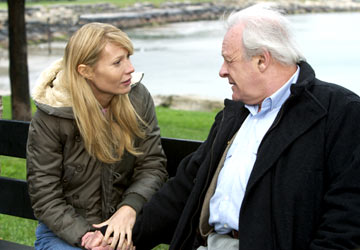Proof (2005)
 Hollywood portrayals of university campuses (er, campi)
are often something of a stretch, but I found that in
“Proof,” academia had a realistic feel. The campus
itself is easy enough to show, with grand old buildings and
manicured grounds, but to get a clear understanding, one needs
to look into the buildings, into the professors' offices and the
discussions they have with their students. One needs to hear
the students calling home to check on aging parents and dealing
with conflicting demands on their time and attention. All of
these elements were captured and presented effectively.
Hollywood portrayals of university campuses (er, campi)
are often something of a stretch, but I found that in
“Proof,” academia had a realistic feel. The campus
itself is easy enough to show, with grand old buildings and
manicured grounds, but to get a clear understanding, one needs
to look into the buildings, into the professors' offices and the
discussions they have with their students. One needs to hear
the students calling home to check on aging parents and dealing
with conflicting demands on their time and attention. All of
these elements were captured and presented effectively.
Performances were uniformly well-done: Paltrow and Hopkins made for a convincing daughter-father pair, with the daughter's concern for her father leading her to choose between her own brilliant career and the care of her father and the father's mixed feelings of comfort from his daughter's presence and frustration at her apparent unwillingness to continue her own promising research.
The film carries with it a certain sadness and loss; after making several lifetimes' accomplishments in several fields, Catherine's father starts “to get sick,” at about the age of twenty-six. The rest of his life was a downhill struggle with mental illness and he could be seen as yet another example that in mathematics, practitioners finish their best work not long after completing their PhDs. I could not help but be reminded of “Losing It,” a Rush song:
Sadder still to watch it die
Than never to have known it.
For you, the blind who once could see,
The bell tolls for thee.
But rather than focusing on the loss of a brilliant mathematician, the film places his work and his life in context. While “the machinery” is gone, the man inspires and drives and his earlier work endures, to be used as foundation for another generation of mathematicians.
It's a wonderful story, presented well on-screen, and it's good to see scientists being seen as something cool for general audiences.

